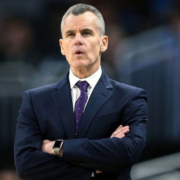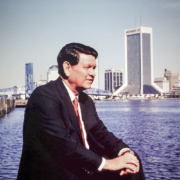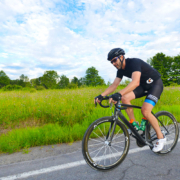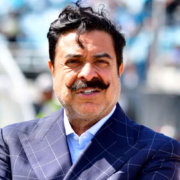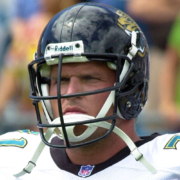Billy Donovan, Still Winning
It was about two-thirty in the morning of April 3, 2007 when Billy Donovan finally emerged from the Gators’ locker room in the bowels of the Georgia Dome. Just a few hours earlier Donovan’s Gators had beaten Ohio State for their second consecutive NCAA Basketball Championship.
I had been in that locker room earlier, doing interviews and watching the team celebrate winning it all for the second year in a row. I had been in the media scrum getting post-game answers from Billy and had seen him in the big press conference set up by the NCAA.
Unapologetically, I’ve called Billy Donovan my favorite person in sports for a long time, and that night I was just looking to shake his hand and say thanks for the ride.
As he walked out he was clearly worn by the night’s activities but still beaming from his team’s success.
“Hey!” he said to me as he crossed the hall to shake my hand.
Amazingly, he was alone. No entourage, no family, no sports information staff.
“Great job,” I said as we walked down the hall.
“You know, that’s the most impressive thing I’ve seen in my career, “ I added.
Billy slowed down and turned to me to ask, “How so?” with genuine curiosity.
“It’s one thing to say you’re coming back to win it,” I explained. “It’s a whole other thing to actually do it.”
“That’s something isn’t it?” Billy said with a laugh.
Donovan was somebody I had gotten to know over the past decade. I had covered the ups and downs of the Gator Basketball program under his leadership for his first 11 years leading up to the national title runs.
At the time the TV station I was working for was the dominant station in Gainesville and Billy had appeared with me many times live on the early news. I was there when they lost to Michigan State in the finals in 2000 and had been in Indianapolis in 2006 when the Gators won their first National Title.
My photographer that night was Matt Kingston, my co-worker and close friend in the sports department. When we traveled together, Matt always figured out how to be in the right place at the right time to get the right shots and this night was no exception.
I noticed Matt backing up and the red light on his camera flashing as Billy and I walked into the lobby of the Georgia Dome. It’s an image that always made me smile when we needed to use it in a sportscast in the future.
I was waiting again a week ago Saturday as Donovan exited the floor after the halftime ceremony celebrating the naming of the court at the O’Connell Center in his honor. After a lot of selfies, handshakes and backslapping, Billy was making his way under the stands at the O’Dome. I was standing there, again with Matt, as he emerged with my hand extended.
“Hey!” he said with a familiarity that belied the five-year gap since I’d seen him last.
He bypassed my handshake and hugged me and said, “Wow it’s great to see you. Thanks for coming!”
“Wouldn’t have missed it,” I said as he and Matt embraced.
When asked over the past couple of years what my favorite thing to cover has been during my career, I’ve easily settled on the Gators back-to-back runs to the National Championship.
A college basketball team is easy to get to know. There are only fifteen players on the roster and usually only eight or maybe nine play. You get to know these guys. You develop trusting relationships. I had that with Joakim Noah, but more closely with Chris Richard. Matt and Walter Hodge were pretty tight. So we had good background on what was going on and were able to give context to the on and off-court happenings.
I told Billy that run was the favorite thing I covered in my career and recounted to him the story of walking down the hall in the Georgia Dome.
When I got to the part about “It’s one thing to say you’re coming back to win it. It’s a whole other thing …” Billy piped up loudly and we said in unison “To actually do it!” And we both had a big laugh.
“I remember that!” he said as he was squired away.
“They were an incredible group,” Donovan had said earlier that night. “Connected as a team, played for one another, highly competitive. I think that they should go down as one of the greatest teams of all time. They started off unranked and won a national championship. (Winning their first and second round games in Jacksonville.) Then won a national championship starting the season ranked No. 1 with all the expectations to do it. And they did it under both circumstances.”
Having hired Donovan early in his 25-year tenure as Athletic Director at Florida, Jeremy Foley was instrumental in floor naming project. He and current AD Scott Stricklin worked together presenting it to the University and flew to Oklahoma City to tell Billy it was going to happen last fall.
“What Billy accomplished here no one ever could have anticipated,” Jeremy said standing on “Billy Donovan Court.” “There’s probably a whole generation that thinks Florida basketball has always been on the map. He did it with an outstanding group of assistant coaches and an incredible support staff, but at the end of the day, Billy Donovan created something very special here.”
“During my time at Kentucky,” Stricklin said of his five years with the Wildcats basketball program, “I had a front-row seat for the impact Billy made, not just on the Florida program, but our league. You saw the kind of coach and person he was, and the respect he had around the country. This was just an obvious way to honor him.”
Those are big shoes current Gators Head Coach Mike White has had to fill. It could be intimidating, but While was nothing but supportive of honoring Donovan’s legacy.
“It’s a given,” White said. “To me, the way people revere him as a human being in this profession says as much about him as the games and championships he won. This is something that definitely needed to happen.”
“It’s really emotional for me, and I’m humbled and grateful for this day,” Donovan said to thunderous applause during the halftime ceremony. “When I look at my name down there, I don’t just see my name. I look at a lot of other people and their names. When you look down at the court, don’t just see my name; see your name there. You’re as much a part of it as well.”
Many of those people who were part of Billy’s 19-year run of success at Florida came back to honor him that night. From assistant coaches to former players, more than a dozen who played in the NBA, all were on hand, most to just say “thank you” for the impact Donovan had on their lives and careers.
“It’s crazy to just how great of a program he helped build and how it prospered under him,” former Gator Guard Chris Chiozza told ESPN. com. “I don’t know if there’s ever been something like this where you walk in and you see 15 NBA guys in here and we come together, we’re talking like we just played on the same team and most of us were years apart.”
Billy has continued his success in the NBA. Donovan has helped the Oklahoma City Thunder to a division title and a perennial spot in the post-season. They’re currently the 6th seed in the Western Conference but after a so-so start to the season they’ve been one of the hottest teams in the league since the first of the year. They’d won four straight and eight of their last ten going into this weekend.
“As coaches, in the end, it’s not about wins and losses,” Billy reminded everyone that night. “It’s about how our players talk about us. Those are the relationships that last and that’s what important.”
In other words, Billy’s still helping everybody win.
I do have one complaint about that night. And maybe it’s nit picking. Is the decal saying “Billy Donovan Court” too small? It’s great and looks like Billy’s signature. But maybe a little bigger?

